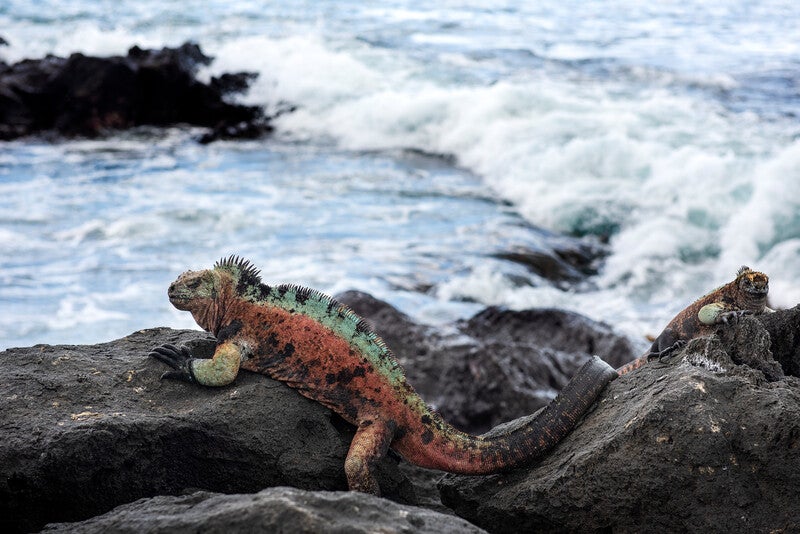Rewilding: Leonardo DiCaprio pledges $43m to protect and reintroduce rare species on Galapagos Islands
‘We have degraded three quarters of the world’s wild places’, actor says, urging decisive action

Your support helps us to tell the story
From reproductive rights to climate change to Big Tech, The Independent is on the ground when the story is developing. Whether it's investigating the financials of Elon Musk's pro-Trump PAC or producing our latest documentary, 'The A Word', which shines a light on the American women fighting for reproductive rights, we know how important it is to parse out the facts from the messaging.
At such a critical moment in US history, we need reporters on the ground. Your donation allows us to keep sending journalists to speak to both sides of the story.
The Independent is trusted by Americans across the entire political spectrum. And unlike many other quality news outlets, we choose not to lock Americans out of our reporting and analysis with paywalls. We believe quality journalism should be available to everyone, paid for by those who can afford it.
Your support makes all the difference.Leonardo DiCaprio has said he is donating $43m (£30.4m) to help protect and rewild the Galapagos Islands.
The remote Pacific islands’ unique array of native wildlife played a key role in Charles Darwin’s theory of natural selection, but many of the ecosystems the islands support are in crisis.
The human introduction of rats and other invasive species have decimated populations of birds and reptiles, while industrial fishing has damaged fragile environments and the climate crisis and emergent disease pose long-term risks to recovery.
But a new initiative called Re:wild, of which DiCaprio is a founding member, says it will work with the Galapagos National Park Directorate, Island Conservation, and local communities to protect and rewild the Galapagos.
This will involve reintroducing locally extinct species and re-establishing wildlife populations to bring back functional and resilient ecosystems that also allow for a level of human integration.
The group has said the work on the Galapagos represents the start of a rewilding programme which they hope to eventually roll out across all of Latin America’s Pacific archipelagos.
DiCaprio’s $43m pledge to the initiative will fund projects on the Galapagos including restoration work on Floreana Island which is home to 54 threatened species and will be where 13 locally extinct species will be reintroduced, including the Floreana mockingbird – the first mockingbird described by Charles Darwin.
It will be used to prevent the extinction of the pink iguana through a captive breeding programme and other activities. The critically endangered species, of which there are just 300 individuals left, lives on an active volcano on Isabela Island and could potentially be totally wiped out by a single eruption.
The funds will also be used to strengthen measures protecting the islands’ marine resources to boost ecotourism, a critical component of the economy.
Announcing his support, DiCaprio said: “Around the world, the wild is declining. We have degraded three quarters of the wild places and pushed more than one million species to the brink of extinction.
“More than half of Earth’s remaining wild areas could disappear in the next few decades if we don’t decisively act.”
The reintroduction on the Galapagos will be led by wildlife veterinarian and island restoration specialist Dr Paula Castano.
She said: “Time is running out for so many species, especially on islands where their small populations are vulnerable and threatened. Galapagos’s pink iguanas, Floreana mockingbirds and other wildlife may soon be lost forever without action.
“We know how to prevent these extinctions and restore functional and thriving ecosystems – we have done it – but we need to replicate these successes, innovate and go to scale.
“We need catalytic investments like the one announced today to replicate our successes in the Galapagos and elsewhere.”
Over the next decade, the initiative hopes to restore 25 islands and protect at least 30 per cent of each country’s waters, while also halting and reversing the decline of more than 250 globally threatened species.
“In order to reverse the climate crisis and ecosystem collapse, we need to focus on a ‘technology’ that took billions of years to refine, that is free, and that sustains us every single day: nature, in its most wild form,” said Wes Sechrest, Re:wild chief scientist and chief executive.
“Where better to begin than the Galapagos, which, as the first-declared World Heritage Site, is among the most extraordinary wild places on the planet.”
Henry Cobos, the mayor of San Cristobal in the Galapagos said: “This new initiative is a great opportunity for the Galapagos to be a global leader in rewilding, protecting and restoring our natural resources not only for the people of Ecuador, but for the people of the world.
“We have committed local and global partners, the buy-in of local communities who are helping lead these efforts, and we know how to bring back the wildlife and wildlands we’ve lost and how to protect the rest.”
Join our commenting forum
Join thought-provoking conversations, follow other Independent readers and see their replies
Comments